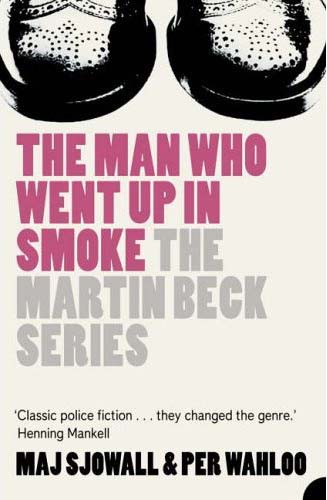
EURO CRIME
Reviews

Sjowall, Maj and Wahloo, Per - 'The Man Who Went Up In Smoke' (translated by Joan Tate)
Paperback: 288 pages (Aug. 2006) Publisher: HarperPerennial ISBN: 0007232845
The classic series of ten books about Swedish policeman Martin Beck and his team is so often held up as the epitome of crime writing: the turning point between the "golden age" of the hero detective and the modern police-procedural, that one wonders if the praise is overstated. And can the books stand the test of time? The first few were written in the 1960s, in a time before the internet, email, mobile phones, faxes that we take for granted and have come to expect as the aides to modern detection.
I thoroughly enjoyed the first of the series, ROSEANNA, but felt that one book was not enough to form an opinion of the whole series. But after the second marvellous volume, THE MAN WHO WENT UP IN SMOKE, I'm convinced.
Martin Beck is interrupted from a holiday about which he feels at the best ambivalent, and asked by his boss to go to Hungary to see if he can find a journalist, Alf Matsson, who has mysteriously disappeared. Beck is not too upset about this, and goes off - somewhat hampered by the need for discretion requested by Matsson's editor and which has been agreed by Beck's superiors as well as the security services in the Iron Curtain era.
Quite a large part of the book features Beck's Hungarian experience: the pockets of faded grandeur such as the hotel where he stays and the old steamers that remain from happier times before the Soviet invasion. He is convinced he is being followed, and soon enough he encounters the local police in the form of the enigmatic Vilmos Szluka. Gradually, the two men drop their mutual suspicion and develop a respect of each other's methods. As they begin to compare notes openly, Beck begins to see a few leads. He follows one or two of these, which seem to turn out to be red herrings, before eventually returning home, none the wiser.
The second, and shorter, part of the book is about the continuing investigation back in Sweden, where Beck is assisted by his intelligent and solid (metaphorically and literally) colleague Kollberg, and others from his team. As in ROSEANNA, the detectives don't give up, they doggedly explore every lead, work on every angle - and in the end, by dint of questioning everyone and everything connected with the missing man, a refusal to take any description at face value, and intelligent reasoning, Beck works out what happened. It isn't all unglamorous police work: inspiration plays its part, an intuition possible because it is built on the solid foundations of evidence that the team have inexorably built up. The answer isn't what we at first suspected, but in retrospect, it all fits together perfectly with the careful plotting throughout the earlier parts of the story.
This book is marvellous: I can't wait to read the rest. Joan Tate is to be congratulated for her smooth translation from the Swedish, and Harper Perennial is similarly to be admired for the new edition, containing an introduction (by Val McDermid), a retrospective and an interview with the authors. Would that all books were so thoughtfully produced, with this type of welcome additional richness for the reader.
Maxine Clarke, England
October 2007
Details of the author's other books with links to reviews can be found on the Books page.
More European crime fiction reviews can be found on the Reviews page.